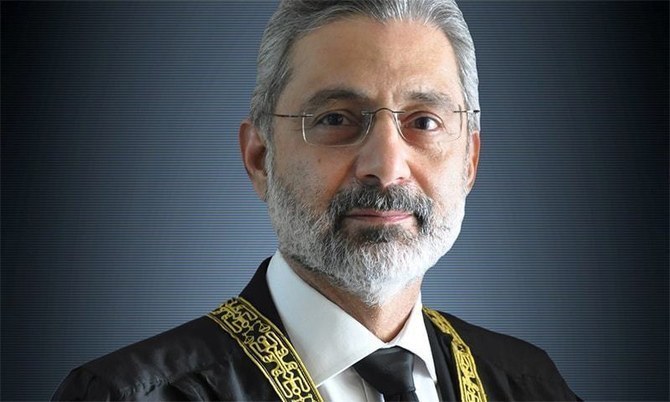ISLAMABAD: Justice Qazi Faez Isa on Sunday took oath as the 29th chief justice of Pakistan, a day after his predecessor, Umar Ata Bandial, hanged up the robes.
The oath-taking ceremony took place at the President House in Islamabad, where President Arif Alvi administered oath to the new chief justice. Caretaker Prime Minister Anwaar-ul-Haq Kakar was also present on the occasion.
For the first time in Pakistan, Justice Isa’s wife, Sarina Isa, who faced litigation in a 2019 presidential reference against the judge, was also seen standing beside him as he took oath of his office.
Justice Isa has an association with law spanning 45 years. He practiced as a lawyer for about 27 years, before being appointed chief justice of the Balochistan High Court in August 2009. He took oath as a judge of the Supreme Court on September 5, 2014.
“I, Qazi Faez Isa, do solemnly swear that I will bear true faith and allegiance to Pakistan, that as chief justice of Pakistan, I will discharge my duties and perform my functions, honestly, to the best of my ability, and faithfully, in accordance with the Constitution of the Islamic Republic of Pakistan and the law,” the top judge said at the oathtaking.
“I will abide by the code of conduct issued by the Supreme Judicial Council, that I will not allow my personal interest to influence my official conduct or my official decisions... May Allah Almighty help and guide me, ameen.”
Born in Quetta in 1959, Chief Justice Isa is the son of the late Qazi Mohammad Isa of Pishin, who was at the forefront of the Pakistan Movement, and the grandson of Qazi Jalaluddin, the prime minister of the pre-partition Kalat state.
His judgments reflect a strong desire to adhere to the constitution and the rule of law, and to safeguard public interest. Being a lawyer in the past, Isa served as ‘amicus curiae,’ which translates to a friend of the court, on various occasions and provided assistance to high courts and the Supreme Court in a number of complicated cases.
The top judge faced a presidential reference, filed by the Imran Khan-led government, in May 2019 that alleged Justice Isa had acquired multiple properties in London in the name of his wife and children from 2011 to 2015, but did not declare them in the statement of his assets.
Justice Isa had contested the allegations and maintained he was neither directly nor indirectly a beneficial owner of the flats.
In June 2020, a 10-member Supreme Court bench nullified the presidential reference against Justice Isa, but seven of the judges on the bench ordered revenue authorities to seek explanation from the judge’s wife and children on the source of funding for the said properties.
Justice Isa won the case in 2021, which rendered the entire exercise by revenue authorities null and void.
In April this year, Justice Isa faced criticism for his extraordinary move to attend a parliamentary session on the golden jubilee of the 1973 Constitution of Pakistan, with some opposition members and lawyers saying the constitution called for a distinction between the judiciary and the executive.
But the judge justified his action and said the event was held to commemorate an important day in the country’s history and he was assured that no political speeches would be made during the session, and it would only discuss the constitution and its making.





















